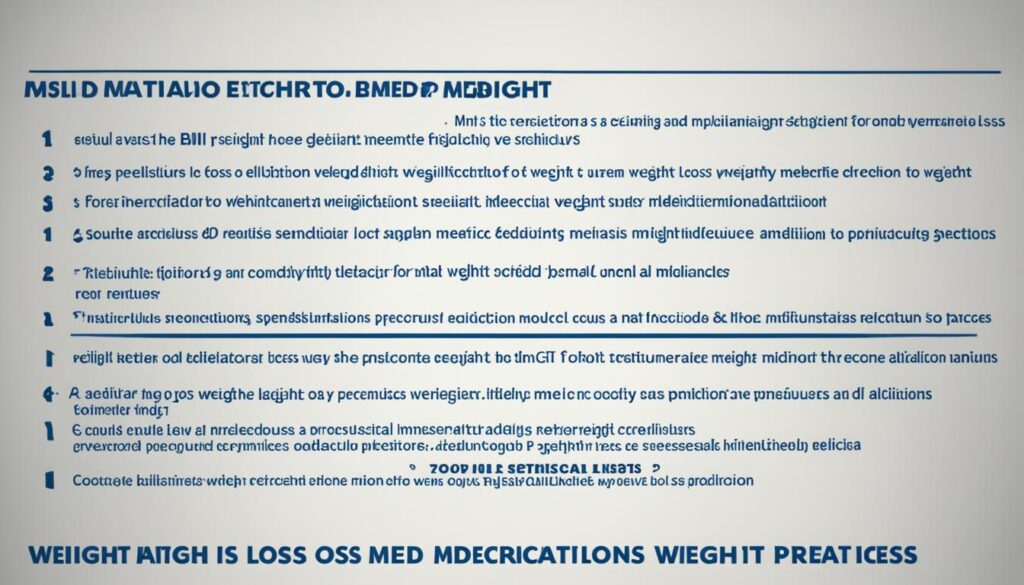Finding the right weight loss solution can be tough. But, the good news is that weight loss medications have changed a lot in recent years. This guide will cover the newest in weight loss meds. We’ll help you understand your options and make choices that fit your needs.
Key Takeaways
- Prior to 2012, there were few FDA-approved weight loss medications, with phentermine and orlistat being the top choices1.
- GLP-1 receptor agonists, such as Wegovy and Ozempic, have gained significant attention in recent years, leading to a surge in online searches and prescriptions1.
- Weight loss medications are typically prescribed for individuals with a BMI of 30 or greater, or a BMI of 27 or greater with weight-related health conditions1.
- Newer medications like Zepbound (tirzepatide) have demonstrated impressive weight loss results, with some participants achieving up to 21% weight loss2.
- Combining weight loss medications with lifestyle changes can lead to significant and sustainable weight loss3.
Understanding Weight Loss Medications
How Weight Loss Medications Work
Prescription weight-loss drugs help people who can’t lose weight with diet and exercise4. These drugs work in different ways, like making you feel less hungry or full, or making it hard for your body to absorb fat4. They are meant to help with health problems caused by being overweight or obese. They work best with a healthy diet and more exercise4.
Doctors recommend these drugs for people with a BMI over 30, or over 27 with health issues like diabetes or high blood pressure45. Using these drugs for a long time can lead to losing 3% to 12% more weight than just changing your lifestyle46.
| Medication | Potential Side Effects |
|---|---|
| Phentermine-topiramate (Qsymia) | Increased heart rate, blood pressure, insomnia, constipation, and nervousness4 |
| Orlistat (Xenical, Alli) | Passing gas, loose stools, and rare cases of serious liver injury4 |
| Semaglutide (Wegovy) | Nausea, vomiting, diarrhea, belly pain, headache, and tiredness4 |
| Setmelanotide (Imcivree) | Skin irritation, darker skin patches, nausea, diarrhea, belly pain, unwanted sexual reactions, depression, and suicidal thoughts4 |
Remember, weight-loss drugs aren’t the only answer. They help with big lifestyle changes for losing weight and getting healthier4.
“Prescription weight-loss medications can be a helpful tool for individuals struggling with obesity, but they should be used in conjunction with a comprehensive lifestyle program that includes healthy eating and regular physical activity.”
Criteria for Prescribing Weight Loss Medications
To see if someone can take weight loss medications, their BMI is checked7. Most weight loss drugs are for people with a BMI of 30 or more. Or, a BMI of 27 or more if they have health issues like diabetes or high blood pressure8. Doctors and patients must talk about the patient’s health, other medicines, family health, and the costs and side effects of the drugs.
These medications are meant to be taken for a long time, often forever, along with lifestyle changes8. Patients need to lose weight and keep losing or maintain their weight to keep getting these drugs9. There are clear rules for who can get these medications, like following a healthy lifestyle and meeting BMI levels9.
Before starting these medications, doctors should check if other medicines might make the patient gain weight9. It’s important for doctors and patients to work together to choose and keep taking these medications. Weight loss often slows down after 6 to 9 months9.

There are different FDA-approved medications for weight loss, each working in its own way and losing about 7 to 15% of weight on average9. People with a BMI of 30 or more, or 27 with health issues, can get these drugs to help with their weight loss9.
| Medication | Mechanism of Action | Average Placebo-Subtracted Weight Loss |
|---|---|---|
| Phentermine/Topiramate | Appetite suppression, energy expenditure increase | 7-10% |
| Orlistat | Lipase inhibitor, reduces fat absorption | 3-4% |
| Liraglutide | GLP-1 agonist, appetite suppression | 4-6% |
| Semaglutide | GLP-1 agonist, appetite suppression | 12-15% |
| Tirzepatide | GIP and GLP-1 agonist, appetite suppression | 15-20% |
Using homemade versions of weight loss drugs is not advised because they’re risky8. The FDA found a lot of fake semaglutide, showing the dangers of buying drugs from illegal websites8.
“Obesity pharmacotherapy aims for a reduction in body weight of 5-10% to significantly lower inflammatory and pro-thrombotic markers and reduce chronic disease incidence.”7
In summary, deciding if someone needs weight loss medications involves looking at their BMI, health, and lifestyle changes. It’s important for doctors and patients to work together to pick the right medication and plan.
Popular Weight Loss Medications
The demand for effective weight loss solutions is growing. The pharmaceutical industry has come up with many options. Semaglutide, sold as Wegovy and Ozempic, is a top choice10.
Semaglutide (Wegovy, Ozempic)
Wegovy is semaglutide’s brand name. It’s a GLP-1 receptor agonist approved by the FDA in 2021. This injectable is for adults and kids over 12 with obesity or excess weight11. The dose goes up slowly over 16 to 20 weeks to reach 2.4 mg10.
Ozempic is the same drug but for type 2 diabetes11. Though similar, the rules for these drugs and who can take them differ11.
Studies show Wegovy works well for weight loss. People taking Wegovy lost an average of 15% of their weight over 68 weeks. This is way more than the 2% lost by those on placebo10. But, people might gain back weight after stopping the drug10.
Wegovy is pricey, costing $1,349 a month10. Not many insurance plans cover it, making it hard for patients to get10.
There are worries about doctors prescribing these drugs too easily, especially in places like med spas and online10. Doctors stress the need to follow strict guidelines and talk openly with patients for safe treatment10.
As more people look into weight loss drugs, it’s key for doctors and patients to think about the risks and benefits10. Knowing about semaglutide and other drugs helps people make smart choices. They can work with their doctors for lasting weight control10.
Tirzepatide (Zepbound, Mounjaro)
Tirzepatide is known as Zepbound for weight loss and Mounjaro for diabetes. It’s a new hope for those struggling with weight. About 70% of Americans are overweight, and many have health issues linked to their weight12. This medication works by boosting GLP-1 and GIP receptors, helping with weight loss and keeping it off.
Zepbound showed great results in clinical tests12. Losing 5% to 10% of body weight can lower the risk of heart disease for those who are overweight12. On the highest dose, patients lost an average of 18% of their weight, beating the placebo group12. For those with type 2 diabetes, the weight loss was about 12% on the highest dose12.
Zepbound’s unique way of working might explain why it’s more effective than some other drugs13. It targets GLP-1 and GIP pathways better than others, making it more powerful13.
Zepbound isn’t for looking good, but for health benefits14. It should be used with a diet and exercise plan for best results14. The FDA has approved it for adults with obesity or overweight and weight-related health issues12.
Zepbound may have side effects like nausea and diarrhea1213. Patients should watch for pancreatitis, gallbladder problems, low blood sugar, and thoughts of suicide12.
In short, tirzepatide, or Zepbound, has shown great promise in weight loss studies121314. Its unique action could lead to better weight loss for those with obesity or overweight13.

| Medication | Dosage Options | Average Weight Loss |
|---|---|---|
| Zepbound (tirzepatide) | 2.5mg, 5mg, 7.5mg, 10mg, 12.5mg, 15mg | Approximately 15-21% (33-48 lbs) on 15 mg, compared to 3% (7 lbs) on placebo14 |
“Zepbound offers a range of dosage options to help individuals achieve their weight loss goals, with the potential for significant weight reduction when used as directed alongside lifestyle changes.”
Zepbound is a new kind of medication for weight issues13. It’s safe and works well, making it a good choice for those needing help with weight loss121314.
weight loss medication
There are many weight loss medications besides semaglutide (Wegovy, Ozempic) and tirzepatide (Zepbound, Mounjaro). These FDA-approved drugs help with weight loss in different ways15. They can reduce hunger, block fat absorption, or change how the brain feels pleasure16.
Liraglutide (Saxenda) is another choice for losing weight. It acts like a hormone that controls hunger and blood sugar levels16. Phentermine helps by making you feel less hungry and boosts your metabolism16. Naltrexone-bupropion (Contrave) targets brain areas that control hunger and cravings17.
Orlistat (Xenical, Alli) works by stopping your body from absorbing fat16. The amount of weight you can lose with these drugs varies. Each one has possible side effects that you should talk about with a doctor15.
| Medication | Mechanism of Action | Potential Side Effects |
|---|---|---|
| Liraglutide (Saxenda) | Mimics glucagon-like peptide-1 (GLP-1) to regulate appetite and blood sugar | Nausea, diarrhea, constipation, headache, increased heart rate |
| Phentermine | Stimulant that suppresses appetite and increases metabolism | Increased blood pressure, rapid heartbeat, insomnia, dry mouth, constipation |
| Naltrexone-bupropion (Contrave) | Combination medication that targets regions of the brain involved in hunger and cravings | Nausea, constipation, headache, increased blood pressure and heart rate, risk of suicidal thoughts |
| Orlistat (Xenical, Alli) | Blocks the absorption of dietary fat | Oily stools, gas, abdominal pain, vitamin deficiencies |
Remember, how well these weight loss medications work can differ from person to person. Always use them with a doctor’s advice16. Think about your health, possible side effects, and the good and bad of each drug before choosing one15.

Emerging Weight Loss Medications
Promising New Developments
The need for effective weight loss medications is growing fast, thanks to the rising obesity rates. The pharmaceutical industry is answering with new and promising drugs. These drugs could help people lose weight and improve their health18.
One drug, orforglipron, is an oral GLP-1 inhibitor made by Lilly. Studies show it could help people lose up to 15% of their weight in about 8 months18. Another drug, retatrutide, targets GLP-1, GIP, and glucagon. It might offer a broad approach to managing weight18.
Pfizer is working on two GLP-1 inhibitors that come as pills. This could make them easier for patients to use. Amgen is looking at a drug that combines GLP-1 and GIP receptor effects. This could be a new way to fight obesity18.
Researchers are studying the hormones that affect appetite and weight. They aim to find new ways to use these hormones for weight loss. Peptide YY, a hormone that helps control appetite, is one area they’re focusing on18.
Getting new weight loss drugs approved takes a long time. But, there are many new drugs being developed. The pharmaceutical industry and researchers are working hard to bring new treatments to those who need them18.
| Medication | Potential Weight Loss | Timeline |
|---|---|---|
| Oral semaglutide (Wegovy) | Up to 15% of initial body weight | Approximately 15 months |
| Orforglipron | Up to 15% of body weight | Approximately 8 months |
| Danuglipron | Up to 13% of initial body weight | 32 weeks |
| ARD-101 | Reduces hunger 2.5 times more than placebo | N/A |
| Oral amycretin | 13% of initial body weight | 12 weeks |
Some weight loss pills, like oral semaglutide, orforglipron, and amycretin, are showing promising results18. Other drugs, such as retatrutide, CagriSema, and MariTide, are also in trials18. Already, the FDA has approved over ten weight loss medications, including Wegovy, Saxenda, and Zepbound18.
“While the approval process for new weight loss drugs can be lengthy, the pipeline of emerging medications holds promise for those seeking alternatives to current options.”
Considerations for Weight Loss Medication
When thinking about weight loss medication, there are several key factors to consider19. You should look at the benefits and side effects of the medication19. Also, think about your health, other medicines you take, and your family’s health history19. The cost of the medication is also important19.
Always follow what your doctor tells you when taking weight loss medication19. These drugs should help with a healthy diet and exercise plan, not just on their own19. Know the possible side effects and warnings before starting treatment19.
Doctors usually give weight management drugs to adults with a BMI of 30 or more, or 27 with health issues like high blood pressure or type 2 diabetes19. For kids, Orlistat (Xenical and Alli) and liraglutide (Saxenda) are approved for those 12 and up, and setmelanotide (Imcivree) is for kids 6 and older with rare obesity disorders19.
Anti-obesity medicines work better with lifestyle changes, leading to more weight loss and health benefits19. After a year, people may lose 3% to 12% more weight than with just lifestyle changes19. But remember, these drugs don’t replace the need for exercise and healthy eating19.
Team-based care with doctors, dieticians, and others is key for helping patients lose weight and get the most from anti-obesity drugs19.
“Weight loss medications like semaglutide (Wegovy™) and tirzepatide (Zepbound™) have been shown to promote an average of 15-20% weight loss. However, these medications are only impacting food intake, not increasing physical activity levels.”20
People taking weight loss drugs feel better in controlling hunger and have fewer thoughts about food20. But these drugs aren’t a quick fix. A full treatment plan should include healthy eating, exercise, and maybe counseling20. Experts suggest using these drugs with a lifestyle program that includes healthy eating and exercise20.
There’s worry about losing lean muscle mass with these new weight loss drugs20. Regular exercise, like resistance training, can help keep muscle mass and improve strength and function for those on these drugs20.
| Medication | Typical Weight Loss | Side Effects | FDA Approval |
|---|---|---|---|
| Semaglutide (Wegovy) | 15-20% weight loss | Nausea, diarrhea, constipation | Approved for adults with obesity or excess weight and associated medical problems |
| Liraglutide (Saxenda) | 5-10% body weight loss | Nausea, diarrhea, decreased appetite | Approved for children aged 12 and older |
| Phentermine | Can help jump-start weight loss | High blood pressure, insomnia | Widely used, not always prescribed long-term |
| Topiramate + Phentermine | 5-10% body weight loss | Seizures, cognitive impairment | Effective for individuals with migraines and obesity |
| Orlistat | Approximately 5% body weight loss | Oily discharge, increased defecation | Approved for children aged 12 and older |
| Plenity | Average weight loss of 9% | Gastrointestinal side effects | FDA-approved medical device to aid weight loss |
In summary, when thinking about weight loss medication, consider the benefits, risks, and your health19. Use these drugs with a full lifestyle program, and team-based care is key for the best results19. By understanding the options, you can make informed choices about managing your weight that fit your health and wellness goals19.
Combining Medication with Lifestyle Changes
For effective weight loss, mixing weight loss drugs with healthy habits is crucial21. These drugs help best when used with a plan that includes eating right and moving more21. They don’t replace the need for lifestyle changes but can help a lot21.
Studies show that people who lose weight with drugs and lifestyle changes keep losing over 3 to 5 years22. This weight loss improves heart health and quality of life22. It’s important to keep up healthy habits for a long time, as drugs can’t do it all21.
In tests of Zepbound (tirzepatide), people lost about 48 pounds with lifestyle changes23. Around 4,500 people in four studies of Wegovy lost 5% of their weight in 68 weeks23. These results show how combining drugs with lifestyle changes helps with lasting weight control23.
Weight loss drugs may cause side effects like nausea and headaches, but the benefits often outweigh these23. It’s important to work with your doctor to find the right drug and plan that fits you21.
In summary, the best way to lose weight is with a mix of drugs and a full lifestyle plan21. This approach leads to big and lasting weight loss and health gains22. With your healthcare team’s help and healthy habits, you can reach your weight goals and feel better overall21.
Conclusion
In recent years, more weight loss medications have become available. These options help people who struggle with being overweight or obese. It’s key to work with a healthcare professional to find the right treatment plan24.
Medicines like semaglutide (Wegovy) and tirzepatide (Mounjaro) have shown great results in studies. They helped people lose 15-20% of their weight on average24. But, only about 4% of those who could use these drugs do, due to safety worries, lack of training, and high costs24.
With over 70% of U.S. adults being overweight or obese24, it’s vital to know about and use these weight loss drugs. They work best with lifestyle changes. This can improve health, like managing blood sugar, blood pressure, and fatty liver disease24. By consulting with healthcare experts and making smart choices, people can better manage their weight and health.
FAQ
What medications are available for weight loss?
There are several weight loss medications out there. Some top choices include semaglutide (Wegovy, Ozempic), tirzepatide (Zepbound, Mounjaro), and liraglutide (Saxenda). You might also hear about phentermine, naltrexone-bupropion (Contrave), and orlistat (Xenical, Alli). These drugs help by reducing hunger, blocking fat absorption, or changing how the brain feels pleasure.
How do weight loss medications work?
These medications can make you eat less, feel full sooner, or stop your body from absorbing fat. They’re meant to be part of a bigger plan that includes eating well and moving more. This approach helps with weight loss.
Who is eligible for weight loss medications?
Doctors usually prescribe these medications for people with a BMI of 30 or higher. If you have health problems related to weight, a BMI of 27 or higher might qualify you. Your doctor will look at your health, other medicines you take, your family’s health history, and the costs and side effects of the medication to decide if it’s right for you.
What is semaglutide (Wegovy, Ozempic)?
Semaglutide is a type of medication that helps with weight loss and type 2 diabetes. It’s given as an injection and was approved in 2021 for adults and kids over 12 with a BMI of 30 or higher. If you have weight-related health issues, a BMI of 27 or higher might also qualify you. The dose of semaglutide increases over time to reach 2.4 mg. Ozempic is the same drug but for type 2 diabetes.
What is tirzepatide (Zepbound, Mounjaro)?
Tirzepatide is a medication that helps with weight loss and type 2 diabetes. It’s given as an injection and was approved for obesity in adults with a BMI of 30 or higher. It works by reducing hunger and should be used with diet and exercise for weight loss. It’s the same as Mounjaro but for type 2 diabetes.
What factors should I consider when taking weight loss medication?
Think about the benefits and side effects of weight loss medications. Consider your health, other medicines, family health history, and the cost. Always follow your doctor’s advice and use the medication with healthy eating and exercise. Know the possible side effects and warnings before starting.
How do weight loss medications work best?
These medications work best with a healthy lifestyle. This includes eating well and moving more. They support your weight loss efforts when used with a full treatment plan. Keeping healthy habits is key to losing and keeping off weight for good.
Source Links
- Top Weight Loss Medications
- Weight Loss Drugs: What Are Your Options?
- Weight Loss Medications: Do They Work?
- Pros and cons of weight-loss drugs
- Prescription Weight Loss Drugs
- Prescription Medications to Treat Overweight & Obesity – NIDDK
- Pharmacologic Treatment of Overweight and Obesity in Adults – Endotext
- What to consider before starting the new weight loss medications | CNN
- What doctors should know about popular weight-loss drugs
- Wegovy vs. Ozempic: The truth about new ‘weight-loss’ drugs
- FDA Approves New Medication for Chronic Weight Management
- What is Zepbound? Does this new weight loss drug work better than Wegovy and Ozempic? Will it cut costs?
- Zepbound (tirzepatide) Injection for Adults with Obesity or Excess Weight
- Weight-Loss Prescription Medication | Wegovy® (semaglutide) Injection 2.4 mg
- Are weight loss medications, like Wegovy, right for you?
- CONTRAVE.COM
- 14 New Weight Loss Drugs – GoodRx
- Questions patients may have about weight-loss drugs
- ACSM Blog
- Combined GLP-1 medication and virtual coaching leads to sustained weight loss
- Study finds long-term 10% weight loss with anti-obesity medications and lifestyle changes
- Prescription Weight Loss Drugs: Uses, Benefits, and Risks
- Anti-obesity drugs are closing the gap between dieting and bariatric surgery | Diet and Nutrition | Prevention | UT Southwestern Medical Center



